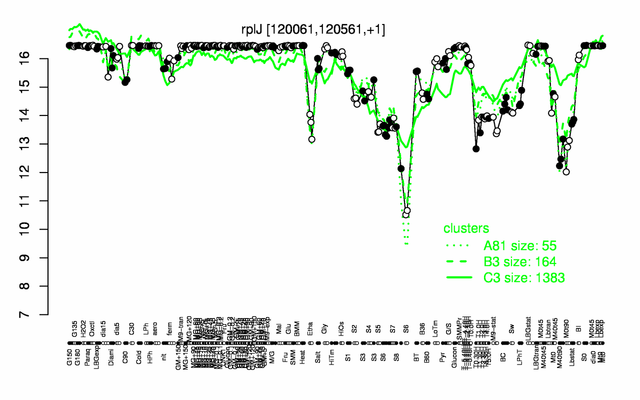RplJ
- Description: ribosomal protein
| Gene name | rplJ |
| Synonyms | |
| Essential | yes PubMed |
| Product | ribosomal protein L10 (BL5) |
| Function | translation |
| Gene expression levels in SubtiExpress: rplJ | |
| Interactions involving this protein in SubtInteract: RplJ | |
| MW, pI | 17 kDa, 5.489 |
| Gene length, protein length | 498 bp, 166 aa |
| Immediate neighbours | rplA, rplL |
| Sequences | Protein DNA DNA_with_flanks |
Genetic context 
This image was kindly provided by SubtiList
| |
Expression at a glance PubMed
| |
Contents
Categories containing this gene/protein
translation, essential genes, most abundant proteins
This gene is a member of the following regulons
L10-L12 regulon, stringent response
The gene
Basic information
- Locus tag: BSU01040
Phenotypes of a mutant
essential PubMed
Database entries
- BsubCyc: BSU01040
- DBTBS entry: no entry
- SubtiList entry: [1]
Additional information
The protein
Basic information/ Evolution
- Catalyzed reaction/ biological activity:
- Protein family: ribosomal protein L10P family (according to Swiss-Prot)
- Paralogous protein(s):
Extended information on the protein
- Kinetic information:
- Modification:
- Effectors of protein activity:
Database entries
- BsubCyc: BSU01040
- Structure:
- UniProt: P42923
- KEGG entry: [2]
- E.C. number:
Additional information
Expression and regulation
- Regulation:
- Regulatory mechanism:
- Additional information:
- belongs to the 100 most abundant proteins PubMed
- number of protein molecules per cell (minimal medium with glucose and ammonium): 1318 PubMed
- number of protein molecules per cell (complex medium with amino acids, without glucose): 7379 PubMed
- number of protein molecules per cell (minimal medium with glucose and ammonium, exponential phase): 5113 PubMed
- number of protein molecules per cell (minimal medium with glucose and ammonium, early stationary phase after glucose exhaustion): 2638 PubMed
- number of protein molecules per cell (minimal medium with glucose and ammonium, late stationary phase after glucose exhaustion): 2690 PubMed
Biological materials
- Mutant:
- Expression vector:
- lacZ fusion:
- GFP fusion:
- two-hybrid system:
- Antibody:
Labs working on this gene/protein
Your additional remarks
References